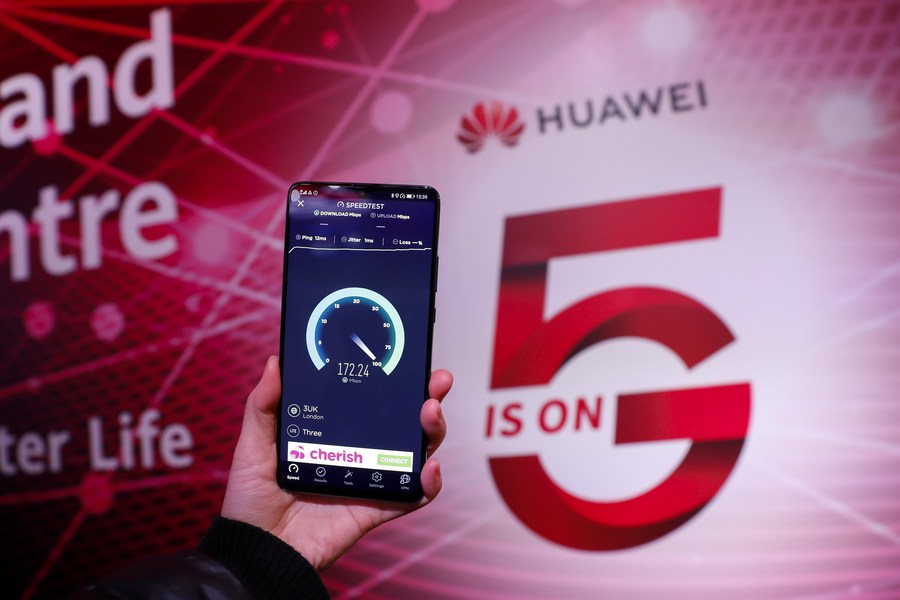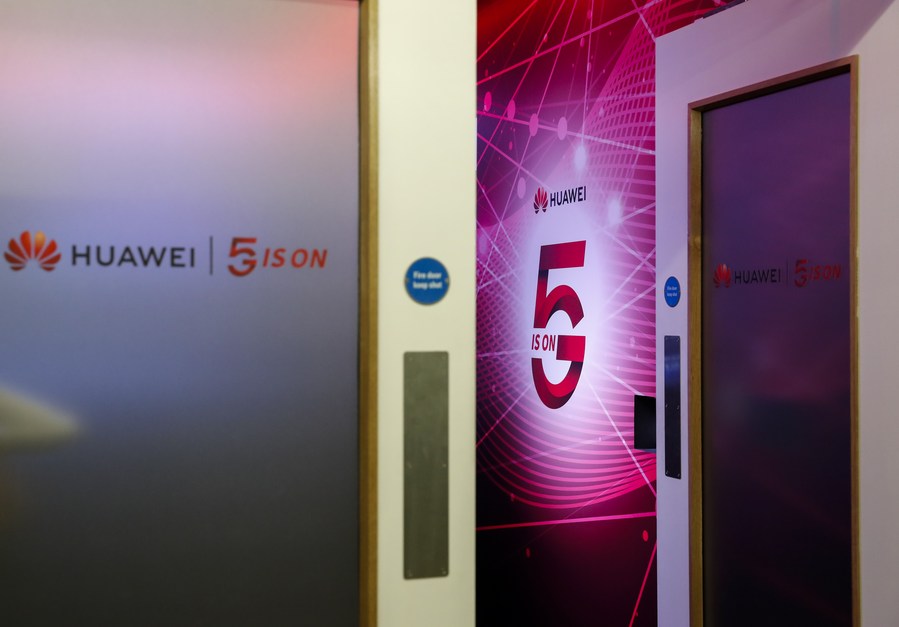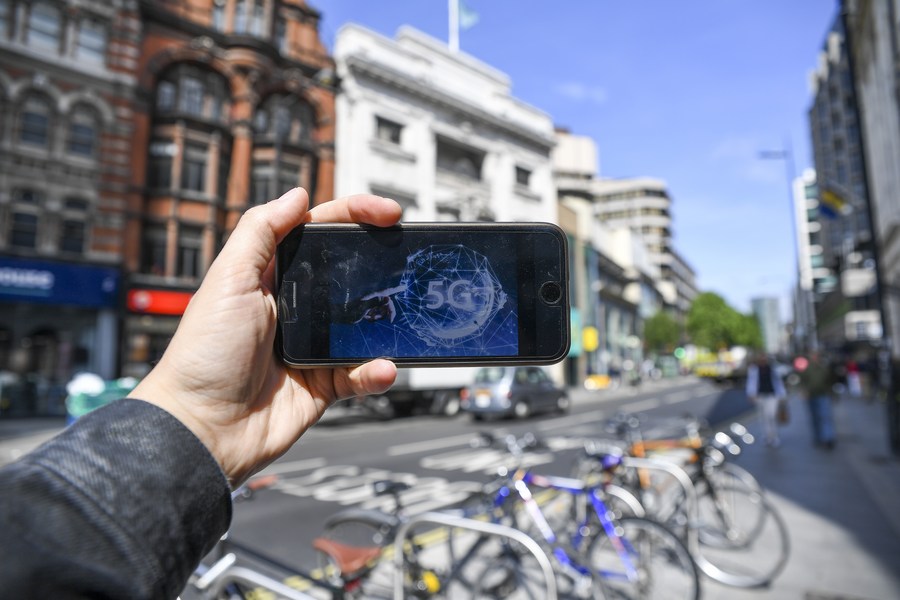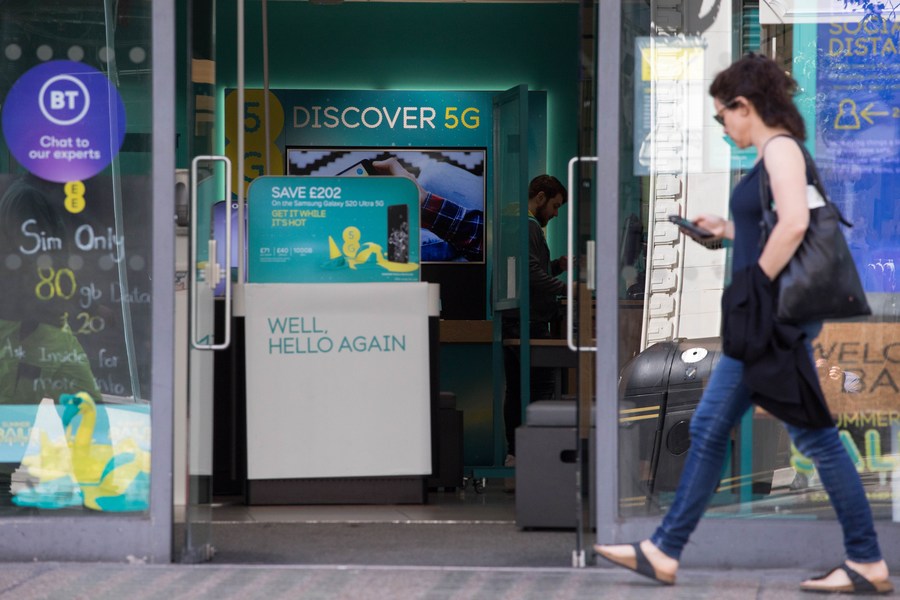

-- By banning Huawei, Britain risks delaying 5G rollout and losing billions of pounds.
-- 5G is widely recognized as a driving force behind a new wave of digital economy.
-- Other major European countries, including Germany and France, are taking a more practical approach in regulating 5G infrastructures.
-- Huawei has invested heavily in R&D endeavours in European countries including Britain, helping advance technological development and create jobs.
LONDON, July 20 (Xinhua) -- Despite the risk of delaying 5G rollout and costing billions of pounds, the British government has decided to ban Huawei's involvement in the country's 5G networks. This has been seen by experts as harming the fairness and diversification of market access, which is key to building a digital economy driven by 5G.
5G is the next-generation telecommunications technology that has the potential to create a better connected world and become a driving force behind a new wave of digital economy.

Photo taken on Jan. 28, 2020 shows a Huawei 5G mobile phone testing speed at the Huawei 5G Innovation and Experience Center in London, Britain. (Xinhua/Han Yan)
In Britain and other major European countries like Germany and France, the telecommunications industry is keen to work with governments, institutions and the wider community to realize the full potential of 5G, which could lead to a digital upgrade in many industrial areas.
To build the infrastructure of 5G, the telecommunications industry needs the best technology and a diversified supply chain, which can only happen with consistent regulating policy by the government.
But in the case of Britain, the government firstly announced in January its plans to safeguard the country's telecommunications security, which is widely seen as approving a restricted role for Huawei in helping build the country's 5G network.
Then in July, the government drastically reversed its policy on Huawei by announcing that buying new Huawei 5G equipment will be banned after Dec. 31, 2020 and all Huawei equipment will be removed from 5G networks by the end of 2027.
This is a costly decision.
Britain's Digital Secretary Oliver Dowden admitted that the decision will lead to "a cumulative delay to 5G rollout of two to three years and costs of up to 2 billion pounds (2.5 billion U.S. dollars)" in the country.

Photo taken on July 20, 2020 shows an advertisement for 5G at a Three store in London, Britain. (Photo by Tim Ireland/Xinhua)
"In a fast moving digital and data-driven economy, this is a very considerable amount of time. While delays can be the result of many reasons, one is that there will be a smaller pool of suppliers, who may not have sufficient capacity to provide the necessary equipment," David Nguyen, senior economist at the National Institute of Economic and Social Research (NIESR), told Xinhua. NIESR is Britain's longest-established independent research institute.
Reducing the number of potential suppliers in the process of building the next-generation telecommunications network in Britain "leads to less competition and potentially higher prices or delays in rollout," said Nguyen.
STATUS QUO IN FRANCE, GERMANY
Major countries in Europe are taking a more practical approach in regulating their 5G infrastructures.
Germany's three major telecommunications operators Deutsche Telekom, Vodafone and Telefonica have been actively promoting 5G in recent years. They implement the "supplier diversification" strategy and use Huawei equipment in their networks among other vendors.
Peter Altmaier, German minister of economy, told the Frankfurter Allgemeine Zeitung on July 11 that Germany would not exclude Huawei from the country's 5G network rollout.

Photo taken on Jan. 28, 2020 shows the Huawei 5G Innovation and Experience Center in London, Britain. (Xinhua/Han Yan)
"There can only be an exclusion if national security is demonstrably at risk. However, we will strengthen our security measures, regardless of which country the products come from," said Altmaier.
"There is no change in Germany's position," a spokesperson of the country's Interior Ministry told local broadcaster ARD on July 16.
Earlier in July, Guillaume Poupard, head of France's national cybersecurity agency ANSSI, told newspaper Les Echos that there will not be a total ban on using Huawei equipment in the country's 5G rollout.
French telecommunications operators, such as SFR and Bouygues, have used Huawei's equipment in their networks. A previous article published by Les Echos pointed out that banning Huawei's equipment will cost the operators dearly.
HUAWEI: NOT JUST AN EQUIPMENT VENDOR
According to Huawei, it has been operating in the British market for some two decades. The company employs 1,600 people in Britain and supplies telecommunications network equipment to all the major mobile and broadband service providers in the country.
Some experts have pointed out that the company's investment has boosted development in more technological areas than just 5G in the country.

A concept image provided by Huawei shows the first phase of a state-of-the-art center to be built in Cambridge, Britain. (Xinhua)
Rick Chandler, chairman of the Communications Management Association (CMA), used to work at telecommunications operator BT, and had experience working with Huawei.
He told Xinhua that Huawei has made significant investments in research and development (R&D) in Britain and worked with businesses and universities, which has yielded good results. Meanwhile, the company has established various labs and research programs in Britain and other European countries.
Last year, Xinhua reporters gained an exclusive insight into Huawei London Research Center, which focuses on the research of Artificial Intelligence (AI) and related technologies.
Haitham Ammar is the team leader of reinforcement learning at the center. He told Xinhua that Huawei maintains an open attitude toward collaboration. For example, researchers at the center have different types of collaborations with other companies or universities in Britain and some European countries.
"And we believe this is also very, very crucial for success. Because you know, we get the best minds in the world to help us crack the hardest problems," said Ammar.
In addition to the AI center, Huawei also announced in June that it will build a state-of-the-art center in Cambridge, Britain, which will focus on the research, development and manufacturing of optical devices and modules.
The company said it will invest 1 billion pounds (1.25 billion dollars) in the first phase of the project, which includes the construction of 50,000 square meters of facilities and will directly create around 400 local jobs.

Photo taken on July 20, 2020 shows an advertisement for 5G at a Three store in London, Britain. (Photo by Tim Ireland/Xinhua)
To an expert like Rick Chandler, this kind of research dynamic is what Britain needs in developing next-generation telecommunications, IoT (Internet of Things) and more.
"I will be really upset if we lost that collaboration and investment that has gone on for so many years just because of the incident (the recent policy U-turn by the British government concerning Huawei)," he said.
Besides Britain, Huawei has similar research facilities and programs in European countries such as France.
The company said it has opened R&D centers in Paris, the southeastern city of Grenoble, Sophia Antipolis technology park, as well as Boulogne-Billancourt, a commune in the western suburb of Paris, and shared the intellectual property of the results of R&D programs carried out in collaboration with its academic partners.
WIDER ECONOMIC IMPACT
Last year, Huawei commissioned Oxford Economics to assess the economic cost of restricting competition in eight markets, which includes Britain, France, Germany, and the United States.

Photo taken on May 30, 2019 shows a 5G network logo on the screen of a mobile phone in London, Britain. (Xinhua/Alberto Pezzali)
The report showed that restricting a key supplier of 5G infrastructure from helping to build a country's network would increase that country's 5G investment costs by between eight percent and 29 percent over the next decade.
In Britain, this translates to 1.8 billion to 11.8 billion dollars in estimated permanent loss in gross domestic product due to delay in 5G rollout, according to the report.
Over the decades, Huawei has played an integral part in building Britain's 3G and 4G networks, with a proven track record. The Chinese company is also a leader in the field of next-generation telecommunications, with the most 5G patents globally as of 2019 and the largest share of 5G standard contributions, according to a study by market intelligence company IPlytics.
"Widely available 5G services are a pillar of a strong digital and data-driven economy and any delays in rollout can threaten long-term economic competitiveness," said Nguyen.

Photo taken on July 20, 2020 shows an advertisement for 5G at an EE store in London, Britain. (Photo by Tim Ireland/Xinhua)
"Faced with economic shocks from Brexit as well as COVID-19, the UK's economic recovery is intrinsically linked to using the latest digital technologies to save costs and raise productivity," Nguyen said.
"However, if the delays in rollout are significant, the potential loss of high-speed, low-latency and energy efficient 5G services can be very detrimental to UK businesses and consumers in the medium- to long-run," he said.
"On the Huawei question ... I think that Britain is retreating from the notion of itself as a major global player," said British scholar and political commentator Martin Jacques in a recent interview with Xinhua.

 Award-winning photos show poverty reduction achievements in NE China's Jilin province
Award-winning photos show poverty reduction achievements in NE China's Jilin province People dance to greet advent of New Year in Ameiqituo Town, Guizhou
People dance to greet advent of New Year in Ameiqituo Town, Guizhou Fire brigade in Shanghai holds group wedding
Fire brigade in Shanghai holds group wedding Tourists enjoy ice sculptures in Datan Town, north China
Tourists enjoy ice sculptures in Datan Town, north China Sunset scenery of Dayan Pagoda in Xi'an
Sunset scenery of Dayan Pagoda in Xi'an Tourists have fun at scenic spot in Nanlong Town, NW China
Tourists have fun at scenic spot in Nanlong Town, NW China Harbin attracts tourists by making best use of ice in winter
Harbin attracts tourists by making best use of ice in winter In pics: FIS Alpine Ski Women's World Cup Slalom
In pics: FIS Alpine Ski Women's World Cup Slalom Black-necked cranes rest at reservoir in Lhunzhub County, Lhasa
Black-necked cranes rest at reservoir in Lhunzhub County, Lhasa China's FAST telescope will be available to foreign scientists in April
China's FAST telescope will be available to foreign scientists in April